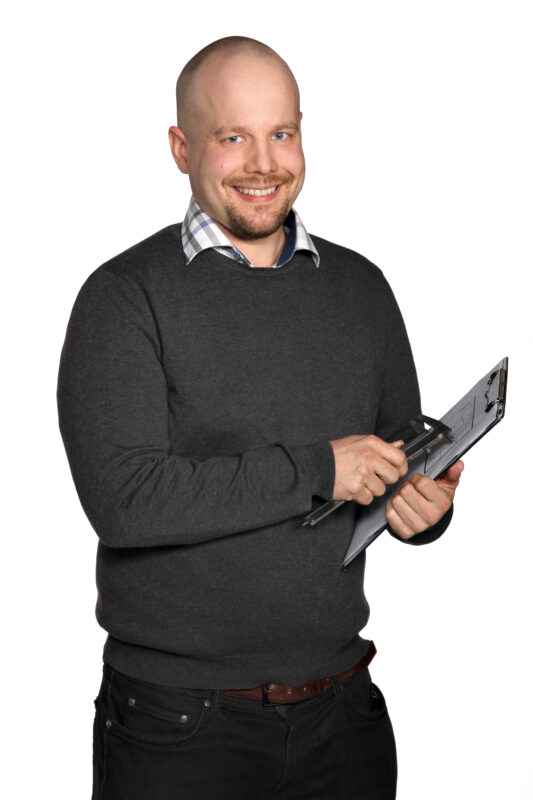
As a project manager at Apila, he ensures that the experts get the necessary fuel for demanding brain work – co-workers recognise his coffee-making skills.
Technology Specialist Olli Mulari, M.Sc. (Technology), works at Apila Group as a Project Manager. Co-workers describe Olli as an easy-going multi-expert. Modestly, Olli replies that he knows a bit of everything as a project manager, but the experts take care of in-depth expertise. “You don’t have to know everything. It’s enough to know who knows.”
Olli specialises in production technology, 3D designs and material reviews. As a project manager, he schedules material and product development projects, manages costs, and takes care that the customer’s goals are achieved. In other words, things need to be done on time.
As a project manager, Olli likes the variety of work and the variety of projects in which the lessons learned can be combined and utilised elsewhere. In addition, customer contacts are also important. “When working in production, there were always sales or customer service in between. In this work, you can also see the customers and the needs of the customers.”
From industry to the circular economy sector by chance
Like many of his co-workers, Olli ended up in Apila by chance and through already familiar people. Interested in the technology, Olli wanted to see the 3D printer Apila used to print geopolymer. CEO Mervi Matilainen was present at the time, and soon the discussion turned into a job interview. In May 2018, Olli started development work at Apila on geopolymer 3D printing.
Before Apila, Olli worked for many years in various positions of responsibility in the industry, including Tulikivi as a Production Engineer and Production Manager. So Olli is familiar with industry and production technologies. “Nowadays, working days also consist more of expert work.” Problem-solving skills were required before, but the current job isn’t quite as hectic. “The problems to be solved in project work are project-specific, and the solution does not have to come immediately, while the problems to be solved in the industry are often acute.”
The problems are there to be solved
Apila has grown tremendously, and the number of employees doubled compared to when Olli came into the house. Premises have also increased. “At first, I had a workspace in the corner of the kitchen,” Olli laughs. The range of projects has also grown, and customer projects have diversified.
The focus on solutions firmly unites Apila’s experts. Regarding the challenges, Olli is realistic: “There are always problems in development work, but there is a solution to them. If there is a problem, it is important not to apply the emergency brake first, but to stop for a moment to think about what the problem is.”
Development of production as a passion
Instead of writing works and the “tweaking” they require, Olli enjoys more practical work and thinking about large entities. He has always been interested in building something new and how equipment and things work together. For example, how a factory works and how materials move there. When considering career choice, the field of technology was a natural choice.
Olli considers getting into the Production Manager position and building an extruder his most significant achievements. An extruder is a device for processing plastics. It was constructed from scrap metal and recycled materials following the circular economy principles. “The starting materials were a pile of iron and an electric motor. It took the most time to think and design because there were no blueprints, just an idea of how each part works.” Despite this, Olli does not consider himself a machine builder or Gyro Gearloose -type of personality. Instead, he is interested in how a single machine sinks into a line or factory.
If Olli were to choose the perfect job, he would develop production holistically. Finding new solutions and setting problems is motivating and getting into customer production is always inspiring. “Developing production, new production lines and commissioning new machines would be a pleasing project.”
Looking to the future
For Olli, the circular economy means thinking about the product’s entire life cycle. Thus, the circular economy means forward-looking work based on product design. In product design, you have to invest in how the product and its materials and raw materials can be utilised after the product’s life cycle has ended.
“The life cycle of a product ends when it is recycled, its materials and raw materials are separated and reused.”
Olli would like to develop his skills by gaining more perspectives on the circular economy and its promotion. The circular economy is not only the development of materials and products but also the development of processes and production methods.
In an ever-evolving field, mastering the industry specific vocabulary in different languages is also essential.
And what will Olli’s future look like? Has he decided what he wants to be when he grows up? “Lego Engineer and retire as a wine monk in Valamo monastery,” Olli laughs.
This was the 5th part of the Apila staff presentation series. You can read previous presentations here:
Managing Director Mervi Matilainen trusts in the power of chemistry
Materials Specialist Juha Timonen is a fount of knowledge
Chemistry expert Tiina Rasilainen makes sure that the projects go like clockwork
Laboratory coordinator Erja Jaala makes room for creativity also in the laboratory
